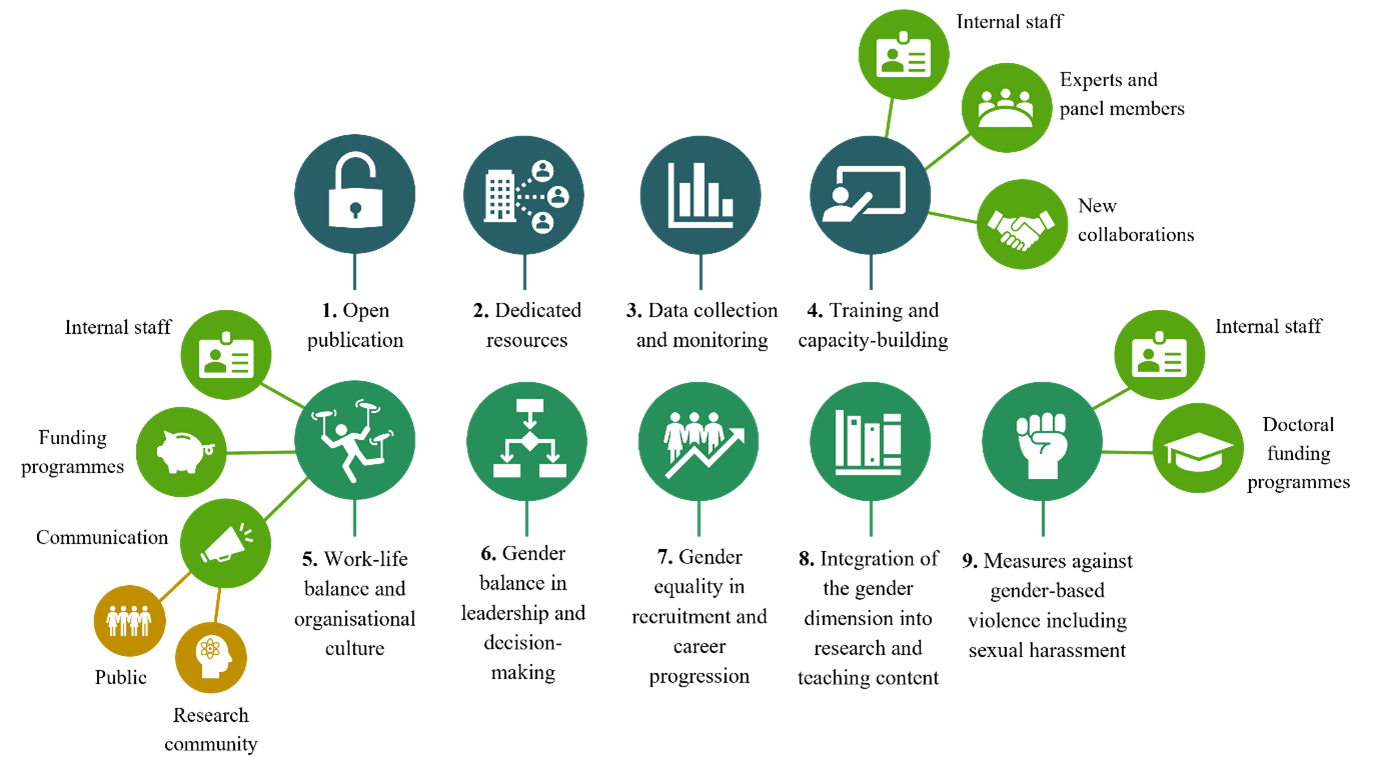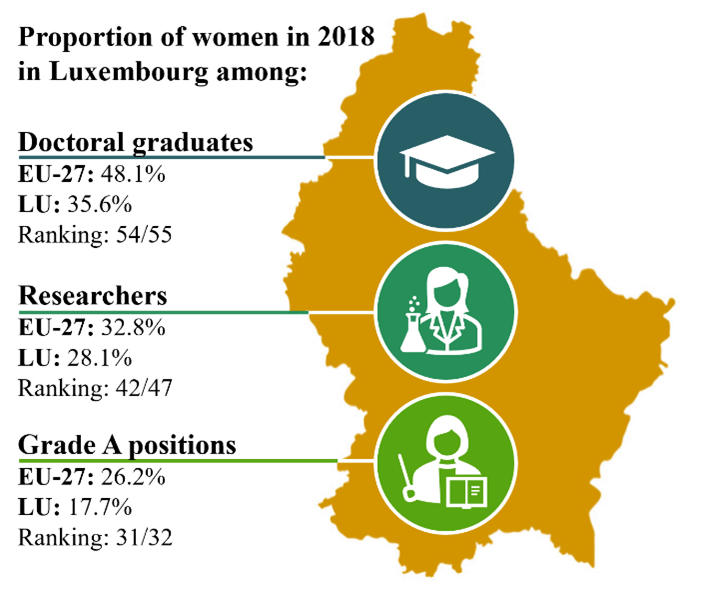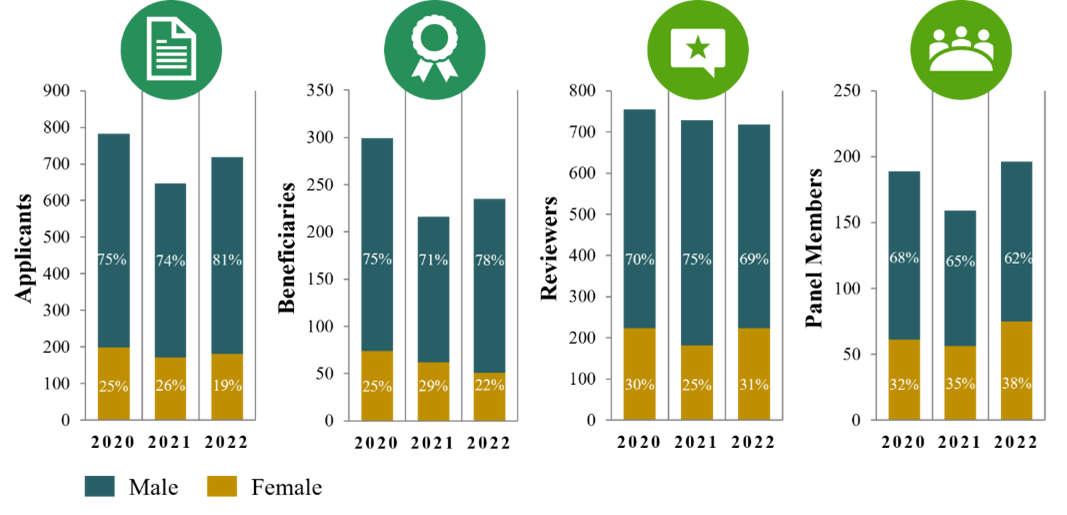Introduction
The FNR believes in equal opportunities for all members of the Luxembourg research community and beyond, and thus supports all activities in this regard in order to establish Luxembourg as a leading knowledge-based society through science, research and innovation, thereby contributing to the country’s economic diversification and future prosperity.
It is crucial that the diversity in society is reflected in the research community to foster social and innovative research. Our role as a research funding organization is to abolish barriers and make science and progress freely accessible to all by promoting equality, diversity, and inclusion.
FNR action plan on gender, equality, diversity, and inclusion for 2022 to 2024
A Gender Equality Plan is a public document that outlines a series of measures and actions to be taken to promote gender equity and inclusion in an organization. The plan must have dedicated resources, arrangements for data collection and monitoring, and be supported by training and capacity-building.
In addition to these mandatory requirements, the plan should also address several additional topics related to gender equity. These include work-life balance and organizational culture, gender balance in leadership and decision-making, gender equality in recruitment and career progression, integration of the gender dimension into research and teaching content, and measures against gender-based violence, including sexual harassment.
The FNR has in place a policy outlining mandatory thematic areas (dark blue) and additional recommended areas (dark green) that must be addressed by a gender equality plan according to the European Commission, including sub-categories of action points that the FNR is dedicated to address for the time period 2022-2024.
View the FNR’s full Integrated Gender Equality Plan
Mandatory thematic areas (dark blue) and additional recommended areas (dark green) that must be addressed by a gender equality plan according to the European Commission, including sub-categories of action points that the FNR is dedicated to address for the time period 2022-2024.
Minimising unconscious bias
At the FNR, we are committed to developing and implementing practices to minimise (un)conscious bias, as well as monitoring and improving gender equality. We are dedicated to advancing gender equality, but also diversity and inclusion across all of our funding programmes.
We ensure that our funding opportunities are accessible to all qualified individuals, regardless of gender, race, ethnicity, national origin, age, disability, sexual orientation, or any other characteristic, to ensure that we foster an inclusive culture that produces better results and a more vibrant research environment.
Gender equality is a fundamental value
Gender equality is a fundamental value of the European Union and is one of the United Nations’ Sustainable Development Goals. It is generally acknowledged that promoting gender equality in research and funding organisations and higher education institutions brings positive impact with respect to various crucial aspects, such as:

Positive impact of gender equality and diversity in the research community as illustrated by the Luxembourg Gender Working Group.
Gender equality in the Luxembourg research community
According to the 2021 SHE Figures report issued by the European Commission, around one in four researchers in Luxembourg are female.5 These numbers place the Grand Duchy below the EU average of one in three. When considering women researchers in Grade A positions (e.g. full professorship or senior researchers), Luxembourg ranks 3rd to last in Europe with only 17,7% of these positions filled by women. The proportion of women doctoral graduates in Luxembourg has further decreased between 2010 and 2018. Among the EU-27, the highest proportion of women doctoral graduates was observed in Lithuania (57.9%) while the lowest proportion was observed in Luxembourg (35.6%) according the SHE Figures report 2021, which are alarming data for the Luxembourg research community.

Proportion of women among different academic career levels and ranking of Luxembourg among other countries according to the SHE Figures 2021 report.
Gender disaggregated data at the FNR (2020-2022)
As part of our commitment to transparency and inclusivity, we would like to share some data regarding the representation of women and men in our research programmes and evaluation process over the past three years (2020-2022).
Applicant Gender across all programmes (2020-2022)
When it comes to applicant gender across all programmes, we received applications from in average 26% women and 74% men over the past three years. We strongly encourage women to apply to our programmes and work hard to ensure that our application and selection processes are fair and unbiased.
Beneficiary gender across all programmes (2020-2022)
Looking at success rates according to gender across all programmes, over the past three years, in average 25% of successful applicants were women and 75% were men. This suggests that gender is not a significant factor in determining success rates in our programmes.
Reviewers and expert panel members gender across all programmes (2020-2022):
Over the past three years, in average 29% of our reviewers were women, while 71% were men. Looking at expert panel members across all programmes, we found that over the past three years, in average 35% were women and 65% were men. It’s important to note that we strive for diversity in our expert panels, not only in terms of gender but also in terms of other factors such as ethnicity, geographical location, seniority, and areas of expertise.
Board Compositions & FNR Staff in 2022:
In 2022, 56% of board members in our scientific council and administrative board are women, while 44% are men. Additionally, 64% of our FNR staff are women and 36% are men.

General gender statistics for overall numbers of applicants, grant beneficiaries, reviewers and panel members that were monitored by FNR between 2020 and 2022.
General action points across all FNR initiatives
To create an inclusive and diverse research community in Luxembourg, the FNR has implemented a number of policies and procedures over the past years to ensure that our funding programs are fair, transparent, and accessible to all within the Luxembourg research community and beyond.
They revolve around equal opportunities, inclusion and diversity.
The FNR also has in place FNR Programme-specific action points and is involved in several collaborations with expert working groups, such as:
- Luxembourg Gender Working Group
- Research Culture Working Group